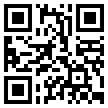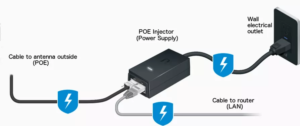Technical Support FAQ
Please visit our Troubleshooting Tips page for an in depth explanation on how to troubleshoot specific problems.
To verify if you are in a current known outage, please visit our real time Network Status Page or call our 24/7 tech support line at 866-866-9986 and select option 2 for up to the minute, automated outage notifications.
If you have verified you are not in a known outage after visiting our Network Status Page and have also read through our general Troubleshooting Tips, but are still having issues, please head over to our Create a Support Ticket page or call our 24/7 tech support line at 866-866-9986 and select option 2 so we can look into this issue for you ASAP.
This is ultimately going to be based on what brand router you have, as every router is a little different.
If you have a Legacy branded Calix router, you may download the CommandIQ™ app that can be found in your app store. You can also scan the QR code below with your phones camera.

With any other router, a simple quick search online can usually answer your question. Below is a link that may give you more insight.
Guide on how to change the password or name of your home's Wi-Fi network.
If you need any assistance with this please Contact Us.
Your routers password and name are typically preset when the router is new. This information can usually be found on the bottom of the router itself and sometimes also can found in the paperwork that comes in the box.
Depending on your router, your password can sometimes be labeled WPA Key and the name of the wireless network can be labeled SSID.
If you change this information, we recommend you write it down and store it somewhere for future reference.
If you need any assistance with this please Contact Us.
To test speeds we recommend using our speed test Here or visiting speedtest.net or fast.com.
Legacy only supports speed tests where a computer is directly hardwired into the router or one that completely bypasses the router by plugging your computer into our handoff/POE. Bypassing your router requires the authentication of a new device on your account so this step cannot be completed without contacting our 24/7 tech support team.
When running a speed test, it is recommended that you do not have any other devices using the service as this will affect your results. For example, if you have a 100mb plan and you are using 10mb of your service on another device, your speed test results for a test run will show to be around 90mb.
Wireless speed tests ran on anything connected via Wifi (cell phone, tablet etc.) are not supported or guaranteed by Legacy. Poor wireless signal from your router throughout your home or business can affect your speeds.
Legacy does not support speed tests ran through any sort of gaming system (PS4, Xbox, etc).
Please visit our Troubleshooting Tips page for an in depth explanation on how to troubleshoot this specific problem.
Any broadband router with an Ethernet WAN port works with our service. A cable/DSL modem will NOT work with our service.
If your plan's speed is above 100 Mbps, make sure your router will support it. Some routers only support speeds up to 100 Mbps.
We recommend going with a “mesh” router system if your house is over 2000 sqft or has more than 1 level. This will help with wifi dead zones in your home.
Our service offers the option of providing your own router or leasing one through us for an additional $8 plus sales tax monthly. Our routers come with a lifetime warranty and replacement. We are not responsible for the maintenance or warranty of your router if you choose to provide your own.
Any new device that is plugged directly into our service has to be authenticated via its MAC address. Until your new device's unique MAC address is added to our system, your service will not work.
Please call our 24/7 tech support line at 866-866-9986 and select option 2 or visit our Create a Support Ticket page so we can further assist you.
Fixed Wireless is a wireless broadband internet service that utilizes licensed and unlicensed radio-frequency (RF) antennas. Because fixed-wireless internet uses land based technology it is not susceptible to the latency and jitter experienced with satellite internet.
Fixed Wireless uses line-of-sight (LOS) technology which refers to an unobstructed path or view, between the antenna on your home or business and one of our towers. Fixed-wireless technology requires LOS for the best possible connection and quality of service. Elevation, buildings, trees, hills, and valleys ultimately determine LOS.

The POE (power-over-ethernet) device is what powers your antenna outside as well as transmits the service into your router via an ethernet cable. It is recommended to periodically reboot this device by unplugging its power for 30 seconds and plugging it back in. The antenna outside is like any other electronic device, a reboot typically solves most issues.
This device is rectangle in shape and either black or white. If there is power to the device, it will have a small white light on it.

Weather, in most instances, will not impact your internet connection, although you may experience temporary loss of service or slow speeds during heavy, severe rain and thunderstorms. If you lose power to your house, your internet will not work as it requires electricity to operate. If your house is struck my lightning, or you get a heavy power surge, it is likely that some devices could be damaged. Legacy recommends that you have all electronic devices plugged into a surge protector to help prevent any damage.
Yes. All of our plans support connection to a VPN for those who connect to work from home etc. A static IP may be required for some VPNs, please verify this with your work's network admin. Speeds may be affected when connected to a VPN, please disconnect from your VPN prior to troubleshooting any internet related issues.
No. Legacy does not control your usage. We do not turn your speeds way down or charge you additional monthly fees if you cross some predetermined amount. Use it as much as you want, when you want.
Legacy will install a single Ethernet jack inside your home in a location determined by you and the technician. This location is where your router will sit. Most routers will allow for 4 hardwired devices to be plugged in at any given time. Wirelessly, you can essentially connect as many devices as you want.
Yes we do! Visit our Whole Home Wi-Fi page to find out more!
No, we do not offer any bundled services. Legacy focuses all of its resources on providing reliable fast internet.
TV - Any streaming services such as Netflix, Amazon Prime Video, YouTube TV etc. will work with our service. More information about these streaming services can be found online.
Email - Legacy does not recommend utilizing a service provider as the host of your email address as service providers change. Always go with a mainstream email provider such as Gmail, Yahoo or Outlook.
Legacy does not have a contract on any of our plans so you can change your plan up or down at any time. With Legacy you pay your bill in advance each month, so if you upgrade your plan, you will owe a prorated charge at that time. If you downgrade your plan, there will be a prorated credit added to your account immediately.
Legacy does not have a contract on any of our plans so you can change your plan up or down at any time. With Legacy you pay your bill in advance each month, so if you upgrade your plan, you will owe a prorated charge at that time. If you downgrade your plan, there will be a prorated credit added to your account immediately.
To change your plan there typically is no equipment upgrade or onsite tech needed. To upgrade your speed, it is a remote change on our end and the change is complete in 5 minutes.
Head over to our Contact Us page and fill out our contact form and a rep will contact you.
A new router can speed up your Wi-Fi, but there are a few variables to keep in mind.
What a new router can’t do is increase the speed of your internet plan. For example, if you have a 100 Mbps internet plan, even the best router on the market can’t make your internet speeds go over 100 Mbps.
If your router is old or low quality, it can possibly prohibit you from seeing correct speeds. Your router sits between your modem and your devices and it can act as a bottleneck.
Keep in mind that a new router may not increase your speed on specific wireless devices you use. If you purchase a "Wi-Fi 6 router", but you’re still using a phone that only supports Wi-Fi 5, then your wireless connection may not increase.
The wired connection that is coming into the home from your provider is attached to your router. From the router, the signal does one of two things. It can be a wired connection via an ethernet cable from the router to a device like a desktop computer or a television.
The second option is wireless internet. The wired connection ends at your router. From here, the signal is transmitted through the air to the devices you have in your home that have the ability to receive wireless signals. For example cell phones, tablets and laptops. These devices use a password to securely connect to the router.
Wired connections will almost always be faster. There are a few things that can affect your wireless internet speeds, including the distance between your device and router. If you are able to hard wire any device, we recommend doing so.
If you have an internet connection over 100Mbps, verify that your router has 1Gb capabilities. Most older routers do not have a 1Gb WAN/Internet port and in turn will not allow your connection to go over 100Mbps.
This is going to depend on two things:
- How you use the internet.
- How many people are using the service at the same time.
Different online activities use different amount of bandwidth. Gaming online or streaming a video on Netflix requires more bandwidth than sending an email. So if you live alone and only send email and occasionally stream TV then you are likely to need less bandwidth than if you have a few kids gaming and watching youtube on multiple devices. The quality of the video you are streaming also plays an important factor in the amount of bandwidth being used.
We recommend the following internet speeds for these activities:
1-20 Mbps
- Checking email
- Normal web usage (searching on google, music streaming, working from home)
- Streaming video (Netflix, Amazon, Hulu) on one or two devices max
- Online gaming on one or two devices max
20-100 Mbps
- Streaming video or gaming (Netflix, Amazon, Hulu) on multiple devices
- Downloading large files
- 4k streaming
100-1000 Mbps
- With a connection of 100Mbps plus you can pretty much do anything on numerous devices and never have any issues.
Our internet service offers low latency, ensuring quick response times for activities like gaming, streaming, and video calls. Our advanced infrastructure minimizes delays, giving you a smooth, real-time online experience. The exact latency may vary based on your location and the type of connection, but we consistently aim to provide optimal speeds with minimal lag typically in the 10-25ms range.